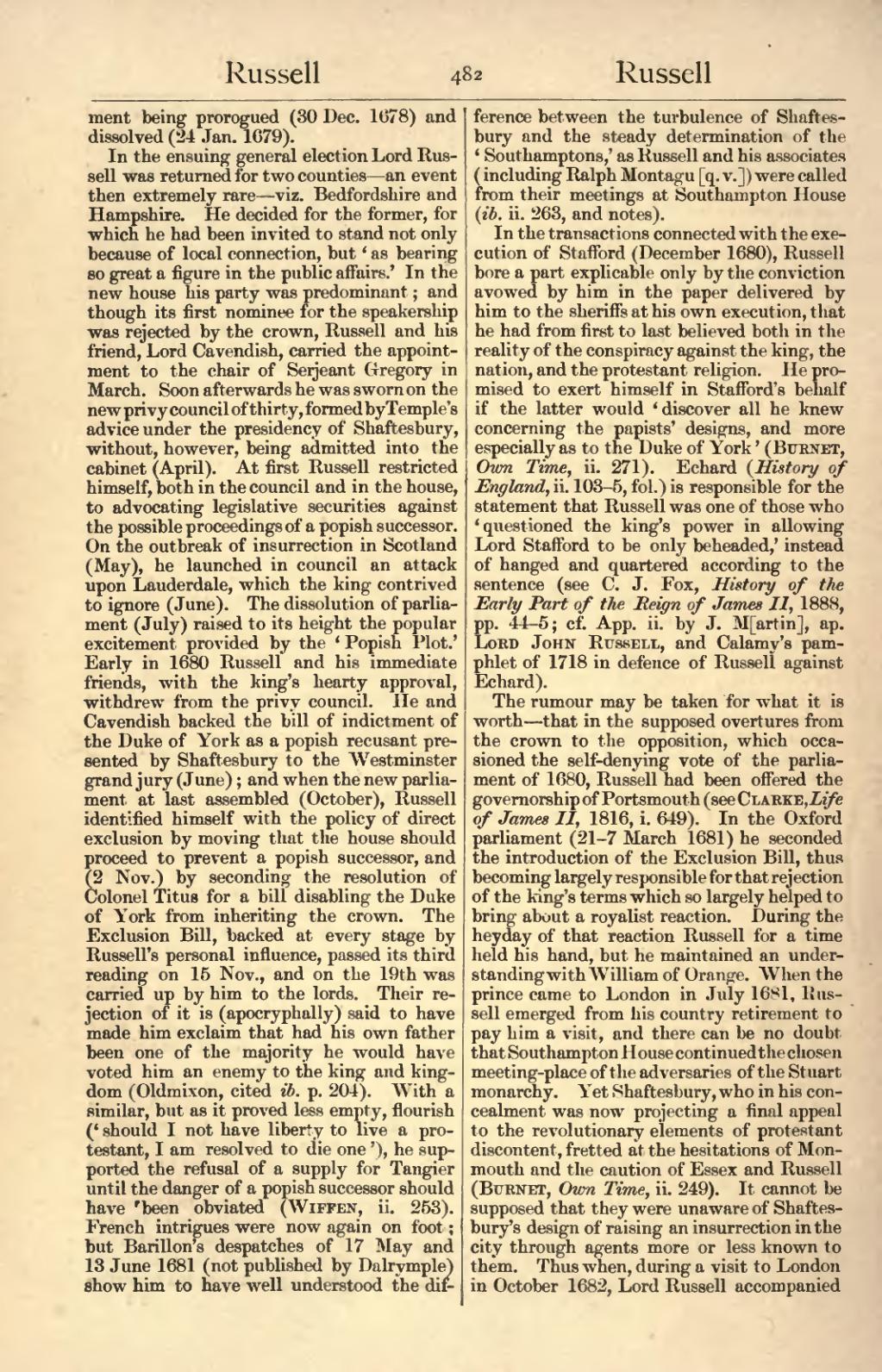ment being prorogued (30 Dec. 1678) and dissolved (24 Jan. 1679).
In the ensuing general election Lord Russell was returned for two counties—an event then extremely rare—viz. Bedfordshire and Hampshire. He decided for the former, for which he had been invited to stand not only because of local connection, but 'as bearing so great a figure in the public affairs.' In the new house his party was predominant; and though its first nominee for the speakership was rejected by the crown, Russell and his friend, Lord Cavendish, carried the appointment to the chair of Serjeant Gregory in March. Soon afterwards he was sworn on the new privy council of thirty, formed by Temple's advice under the presidency of Shaftesbury, without, however, being admitted into the cabinet (April). At first Russell restricted himself, both in the council and in the house, to advocating legislative securities against the possible proceedings of a popish successor. On the outbreak of insurrection in Scotland (May), he launched in council an attack upon Lauderdale, which the king contrived to ignore (June). The dissolution of parliament (July) raised to its height the popular excitement provided by the 'Popish Plot.' Early in 1680 Russell and his immediate friends, with the king's hearty approval, withdrew from the privy council. He and Cavendish backed the bill of indictment of the Duke of York as a popish recusant presented by Shaftesbury to the Westminster grand jury (June); and when the new parliament at last assembled (October), Russell identified himself with the policy of direct exclusion by moving that the house should proceed to prevent a popish successor, and (2 Nov.) by seconding the resolution of Colonel Titus for a bill disabling the Duke of York from inheriting the crown. The Exclusion Bill, backed at every stage by Russell's personal influence, passed its third reading on 15 Nov., and on the 19th was carried up by him to the lords. Their rejection of it is (apocryphally) said to have made him exclaim that had his own father been one of the majority he would have voted him an enemy to the king and kingdom (Oldmixon, cited ib. p. 204). With a similar, but as it proved less empty, flourish ('should I not have liberty to live a protestant, I am resolved to die one'), he supported the refusal of a supply for Tangier until the danger of a popish successor should have been obviated (Wiffen, ii. 253). French intrigues were now again on foot; but Barillon's despatches of 17 May and 13 June 1681 (not published by Dalrymple) show him to have well understood the difference between the turbulence of Shaftesbury and the steady determination of the 'Southamptons,' as Russell and his associates (including Ralph Montagu [q. v.]) were called from their meetings at Southampton House (ib. ii. 263, and notes).
In the transactions connected with the execution of Stafford (December 1680), Russell bore a part explicable only by the conviction avowed by him in the paper delivered by him to the sheriffs at his own execution, that he had from first to last believed both in the reality of the conspiracy against the king, the nation, and the protestant religion. He promised to exert himself in Stafford's behalf if the latter would 'discover all he knew concerning the papists' designs, and more especially as to the Duke of York' (Burnet, Own Time, ii. 271). Echard (History of England, ii. 103-5, fol.) is responsible for the statement that Russell was one of those who 'questioned the king's power in allowing Lord Stafford to be only beheaded,' instead of hanged and quartered according to the sentence (see C. J. Fox, History of the Early Part of the Reign of James II, 1888, pp. 44-5 ; cf. App. ii. by J. M[artin], ap. Lord John Russell, and Calamy's pamphlet of 1718 in defence of Russell against Echard).
The rumour may be taken for what it is worth—that in the supposed overtures from the crown to the opposition, which occasioned the self-denying vote of the parliament of 1680, Russell had been offered the governorship of Portsmouth (see Clarke, Life of James II, 1816, i. 649). In the Oxford parliament (21-7 March 1681) he seconded the introduction of the Exclusion Bill, thus becoming largely responsible for that rejection of the king's terms which so largely helped to bring about a royalist reaction. During the heyday of that reaction Russell for a time held his hand, but he maintained an understanding with William of Orange. When the prince came to London in July 1681, Russell emerged from his country retirement to pay him a visit, and there can be no doubt that Southampton House continued the chosen meeting-place of the adversaries of the Stuart monarchy. Yet Shaftesbury, who in his concealment was now projecting a final appeal to the revolutionary elements of protestant discontent, fretted at the hesitations of Monmouth and the caution of Essex and Russell (Burnet, Own Time, ii. 249). It cannot be supposed that they were unaware of Shaftesbury's design of raising an insurrection in the city through agents more or less known to them. Thus when, during a visit to London in October 1682, Lord Russell accompanied
